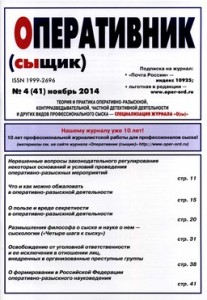Field Investigator (Sleuth). Issue No. 4 (41) for 2014
Problems of Contemporary Investigative Theory and Practice
N.L. Bertovskaya, Lecturer at the Chair of Law, National Research University of Electronic Technology (Moscow),V.A. Obrazcov, Doctor of Law, Professor, Long-service employee of the General Prosecutor’s Office of Russia and Moscow State Law Academy,
L.V. Bertovskiy, Head of the Chair of Criminal Law Disciplines, Moscow Institute of Economics, Politics and Law, e-mail: darlana82@yandex.ru.
Anti-Criminal Fiction as an Element of Technology and Tactics of Operative Search and Investigative Activities.
Annotation. The article discusses the issues related to the definition of forensic and criminal fiction, identifying common features thereof as well as the issue of whether the subjects of anti-criminal activity can use knowingly false information.
Key words: anti-criminal activity, admissibility, forensic fiction, criminal fiction, false information, operative search activities, law enforcement authorities, verification of information.
P.G. Bystrov, Retired Federal Judge, e-mail: yurij-tuganov@yandex.ru.On the Possibility of Using Operative Search Results in Holding Judges Disciplinarily Liable (Comments on the Problem Outlined by V.K. Aulov and Yu.N. Tuganov).
Annotation. A critical appraisal is given to the legislated possibility to use operative search results for holding judges disciplinary liable.
Key words: disciplinary liability, operative search results, judge. B.A. Spasennikov, Principal Researcher at the Research Institute of the Federal Penal Service of Russia (Moscow), Doctor of Law, Professor, e-mail: borisspasennikov@yandex.ru,
A.V. Tsaturov, Candidate for a Ph.D. Degree at the Research Institute of the Federal Penal Service of Russia.
Legal Framework of Operative Search Activities at Institutions of the Federal Penal Service of Russia.
Annotation. The article reviews the legal framework of operative search activities at institutions of the Federal Penal Service of Russia. The authors use their own operative search experience to offer ways to improve it.
Key words: operative search activity, legal framework, Federal Penal Service of Russia.
G.G. Cherepanov, Associate Professor at the Chair of Operative Search Activities of Internal Affairs Bodies, the Far Eastern Law Institute of the Ministry of Internal Affairs of Russia (Khabarovsk), Ph.D. in Law, Associate Professor, e-mail: Gcherepanov@ yandex.ru,
A.A. Shmidt, Associate Professor at the Chair of Operative Search Activities of Internal Affairs Bodies, the Far Eastern Law Institute of the Ministry of Internal Affairs of Russia (Khabarovsk), Ph.D. in Law, e-mail: alexshm79@mail.ru.
Outstanding Issues of Legislative Regulation of Certain Grounds and Conditions of Operative Search Actions.
Annotation. The article considers the issues of legislative regulation of certain grounds and conditions of operative search actions in view of the recently amended Part 3 Article 7 of the Federal Law on Operative Search Activities (as amended by the Federal law of 21 November 2011 No. 329-FZ) and suggests the ways to improve legislative regulation of certain grounds and conditions of operative search actions on both legislative and interagency levels.
Key words: legal regulation, grounds and conditions of operative search actions, compliance with laws, respect for human rights and freedoms.
A.V. Churkin, Associate Professor at the Chair of Criminal Procedure, Military University of the Ministry of Defence of the Russian Federation (Moscow), Ph.D. in Law, Associate Professor, e-mail: tschurkinalex@mail.ru.
Challenging in Operative Search Activity: Issues beyond Both by the Legislation and the Case Law.
Annotation. The article reviews gaps in the legislation related to challenging officers’ and authorities’ actions (omissions) and decisions in operative search activities and the mutually inconsistent case law of the Constitutional Court of the Russian Federation and the Supreme Court of the Russian Federation on these matters. In light of the review, ways of improving the legislation are suggested.
Key words: authorities’ approval, challenge, operative search activity, judicial approval, judicial control.
Current state and perspectives of operative search science in the Russian Federation: papers of the round table held to discuss a monograph by professor A.Yu. Shumilov «Operative search science in the Russian Federation. Volume I: Operative search activities and establishment of the science thereof» (Lyubertsy, Moscow region, 23 April 2014)
M.A. Samelyuk, Doctor of History, Professor, Member of O(sy) editorial board, e-mail: m.alekseev1979@mail.ru.
The Beginnings and the Time of Emergence of the Operative Search Science in Russia Revisited.
Annotation. The article contains the discussion of certain issues at The State and Prospects of the Operative Search Science in the Russian Federation round table session (Lyubertsy, Moscow Region, April 23, 2014, face-to-face form). In particular, the emergence of the operative search science in our country is reviewed, leading to a conclusion in support of A.Yu. Shumilov who believes that the science was officially recognized in 1995.
Key words: history of operative search science, operative search activities, scientific knowledge, investigation.
B.B. Glazunov, Associate Professor at the Chair of Criminal Law, Criminal Procedure and Forensics, Novosibirsk Law Institute of Tomsk State University, Ph.D. in Law, Associate Professor, e-mail: bor219@yandex.ru.
On the Use and Harm of Secrecy in Operative Search Activity.
Annotation. A number of issues are addressed that relate to the influence of the secrecy regimen on the development of the operative search science and other professional investigation sciences.
Key words: operative search science, sorcery, syskologiya, tactics, tactical method.
S.P. Zhdanov, Associate Professor at the Customs Investigations Management Chair, the Law Enforcement Institute of the Russian Customs Academy (Lyubertsy, Moscow Region), Ph.D. in Law, e-mail: zhdanov120009@yandex.ru.
On a Specialist, and Use of His/Her Special Expertise (Knowledge), in Operative Search Activity.
Annotation. The article continues the discussion started at The State and Prospects of the Operative Search Science in the Russian Federation round table session (Russian Customs Academy, April 23, 2014) and devoted to a specialist, and use of his/her special expertise (knowledge), in operative search.
Key words: operative search activity, operative search science, specialist, special knowledge, syskologiya.
O.D. Zhuk, Head of the Faculty of Law, Academy of the Prosecutor General’s Office of the Russian Federation (Moscow), Doctor of law, Professor, Member of O(sy) editorial board, e-mail: ole375@rambler.ru.
On the Officers Involved in the Operative Search Action «Operative Experiment».
Annotation. The article contains the discussion of certain issues at The State and Prospects of the Operative Search Science in the Russian Federation round table session (Lyubertsy, Moscow Region, April 23, 2014, face-to-face form). In particular, the issue of legality of operative search actions in view of legal opinion expressed by the Supreme Court of the Russian Federation and the European Court of Human Rights is reviewed. Certain provisions of the Criminal Procedure Code of the Russian Federation and the Federal Law on Operative Search Activity are analysed. Certain conclusions are made and the ways to resolve the outlined issues are proposed.
Key words: officer, operative search activity, operative search actions, operative experiment, grounds for secret search actions, Federal Law on Operative Search Activities.
G.Ch. Sinchenko, Employee at the Omsk Academy of the Ministry of Internal Affairs of Russia, Doctor of Philosophy, Professor, Honored Officer of Higher Education of the Russian Federation, e-mail: gsinchenko@rambler.ru.
Four Steps to Investigation.
Annotation. Using the neo-Kantian methodology, the article compares investigation with rhetoric, science, and justice. The specifics of pace and rhythm of investigation activities are described as dictated by the proneness to conflict and secrecy. Issues involved in the philosophy of investigation are summarized.
Key words: conspiracy, conflict, science, justice, investigation, syskologia.
V.V. Ukhanov, Senior Researcher at VNII IBiS (Moscow), e-mail: vitaly.ukhanov@yandex.ru.
Release and Exemption from Criminal Liability of Persons Infiltrated into Organized Criminal Groups: A View in the Context of the Operative Search Scientific Provisions.
Annotation. The article contains the discussion of certain issues at The State and Prospects of the Operative Search Science in the Russian Federation round table session (Lyubertsy, Moscow Region, April 23, 2014, teleconference). In particular, certain legal provisions that govern legal protection of persons infiltrated into organized criminal groups are reviewed and ways of improving the legislation in this area are suggested.
Key words: release from criminal liability, operative infiltration, operative search activities, operative search science, organized criminal groups.
A.Yu. Shumilov, Doctor of Law, Professor, e-mail: oper-ord@mail.ru.
On the Development of Operative Search Science Studies in the Russian Federation.
Annotation. To continue the discussion of the operative search development, the article offers certain theses on the introduction of operative search science studies as a new science.
Key words: subject of operative search science, operative search science, operative search science studies, syskologia, aim of operative search science studies.
Tribune of Candidates for Degrees in Law
V.N. Kuznetsov, Ph.D. in Law, Candidate for a Doctor’s Degree in Law, the All-Russian Scientific Research Institute of the Ministry of Internal Affairs of Russia, tel. 8-962-954-2144.
On Legal Relationships Arising in Operative Search Activities when Conducting Counter-Terrorism Operations.
Annotation. The article addresses certain aspects of legal relationships arising in operative search activities as part of anti-terrorism operations. A definition of such legal relationship is suggested.
Key words: counter-terrorism operation, operative search activity, legal relations.
R.R. Osokin, Candidate for a Degree in Law at the All-Russian Scientific Research Institute of the Ministry of Internal Affairs of Russia (Moscow), e-mail:Osokin@slaviabank.ru, Ruslanosokin@yahoo.com.
The Constituent Elements of Criminological Characteristics of Bribery in Customs Sphere.
Annotation. The article considers the individual elements of committing bribery in customs sphere, including a description of the methods of transfer of material assets and receipt of them by the officials in place of taking a bribe, the amount subject to bribes and other elements of the methods of their execution.
Key words: customs sphere, officials of customs, bribes, the method of committing bribery, place of receiving bribes.
Allied Areas of Scientific Knowledge and Practice
S.V. Bazhanov, Lead Research Fellow, Division of Prosecutorial Supervision and Strengthening the Rule of Law in the Sphere of Economics, Scientific Research Institute of the Academy of the General Prosecutor’s Office of the Russian Federation, Doctor of Law, Professor, Member of the Peter’s Academy of Arts and Sciences (Moscow), e-mail: svb-1956@mail.ru.
Correlation of the Procedural Powers under the Code of Criminal Procedure and the Operative Search Powers Vested in Internal Affairs (Police) Officers.
Annotation. The article addresses issues relating to the operative search and criminal procedure activities of internal affairs (police) officers at the pre-trail stage of criminal case investigations.
Key words: evidence, operative search activities, internal affairs agencies, police, powers, criminal procedure.
N.V. Prosandeeva, Doctor of Philosophy, Associate Professor, Professor at the Faculty of Political Sciences, the State Academic University for Humanities (Moscow), e-mail:bardina_natasha@mail.ru.
Efficient Techniques for Ensuring Security in the Information Society: Experience of Other Countries.
Annotation. The author of the article is certain that it is necessary to use the tools employed by various countries’ security forces and proven efficient and effective to protect Russia’s national interests. These include paramilitary and research groups sponsored by private companies rather than by the state; attention to social networks where protest structures organize themselves; detailed content for propaganda and ideological work. The author believes: the more confident our country is in using the tools of its geopolitical rivals, the higher are chances that it wins the global struggle for resources, power and influence.
Key words: security, security arrangement, information-oriented society, effective technology to protect national interests, private companies, terrorism in Cyberspace, propaganda and ideological war, global confrontation.
M.B. Smolensky, Professor, Department of Civil Law Disciplines, Russian Customs Academy (Rostov-on-Don branch), Doctor of Sociology, Ph.D. in Law, Professor, e-mail: rta-sf@mail.ru.
About the Definition of Economic and National Security and Their Regulatory Consolidation.
Annotation. The current state of economic security of the Russian Federation is analyzed from the perspective of the protection of national economy as a part of national security. The definition of economic security as a legal term is proposed.
Key words: protection of the constitutional order, national security, countering external and internal threats, economic security of Russia.
Professional Investigation Abroad. International Cooperation
A.M. Meloyan, Head for Scientific Work Division, Educational Complex of the Police of the Republic of Armenia (Yerevan), Adjunct of the Academy of Management of the Interior Ministry of Russia (Moscow), e-mail: armen.meloyan@yahoo.com.
The History of Formation and Development of Investigative Work in the Republic of Armenia.
Annotation. The author has studied the history of formation and development of investigative work in the Republic of Armenia and the development of police activities, including investigative activities.
Key words: investigative works, detective activity, the book of rules (kanonagirq), church rules, the noun codex book of Mkhitar Gosh, secret police, searching for suspected offenders and criminals, vostanik, vostikan (polisemen).
Review Page
A.M. Voronov, Director of the Center for Legal Foundations for the Development of State Governance and Civil Society at the Institute for Problems of Effective State and Civil Society of the Financial University under the Government of the Russian Federation (Moscow), Doctor of Law, Professor, e-mail: аlex_voronoff@mail.ru.
Review of a monograph by A.S. Izolitov «Conflict of interest in the government and municipal’s employ and countering corruption».
Index of the Articles Published in 2013
№ 1(34) January 2013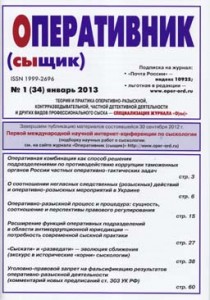 |
№ 2(35) April 2013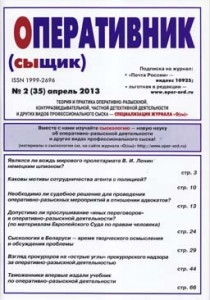 |
№ 3(36) July 2013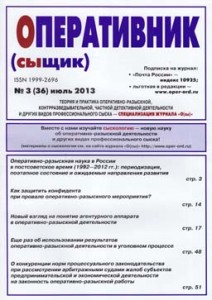 |
№ 4(37) November 2013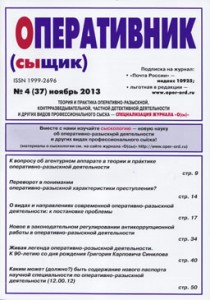 |

